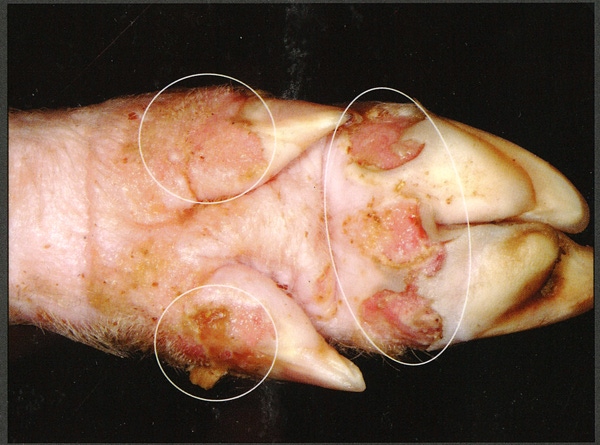British Scientists Develop FMD Vaccine
April 1, 2013

British scientists have developed a new methodology to produce a synthetic vaccine for foot-and-mouth disease (FMD) that triggers optimum immune response but doesn’t rely on live virus for growth and is therefore much safer to produce.
The tiny protein shells in the synthetic process are engineered to be more stable to make the vaccine much easier to store and reduce the need for a cold chain.
Collaborative research was led by David Stuart, Life Science director at Diamond Light Source and professor of structural biology at the Department of Medicine at Oxford and Bryan Charleston, head of Livestock Viral Diseases Program at the Pirbright Institute.
“The FMD epidemic in the United Kingdom in 2001 was disastrous and cost the economy billions of pounds in control measure and compensation. As a result of the outbreak, the Royal Society recommended new approaches should be developed to control the virus should it happen again,” Charleston says.
He adds: “This important work has been a direct result of the additional funding that was provided as a result of the 2001 outbreak to research this highly contagious disease. Using our detailed knowledge of the immune responses to FMD in cattle, we were able to define the characteristics that needed to be incorporated into the new vaccine platform to induce protection.”
Stuart explains: “What we have achieved here is close to the holy grail of foot-and-mouth disease vaccines. Unlike the traditional vaccines, there is no chance that the empty shell vaccine could revert to an infectious form. This work will have a broad and enduring impact on vaccine development, and the technology should be transferable to other viruses from the same family, such as polio virus and hand, foot-and-mouth disease, a human virus, which is currently epidemic in southeast Asia.”
The research results were published last week in the journal PLOS Pathogens, principally funded by the Department of Environment, Food and Rural Affairs, United Kingdom and the Wellcome Trust.
Trials have shown the vaccine is as effective as current vaccines; a commercial vaccine is expected to take years to develop.
To read more about this collaborative effort, visit http://www.bbsrc.ac.uk/news/food-security/2013/130327-pr-new-foot-and-mouth-vaccine.aspx.
You might also like:
Researchers Investigate Novel Pig Stress Syndrome
Here’s Proof it’s Healthy to Raise Hogs in Iowa
You May Also Like



